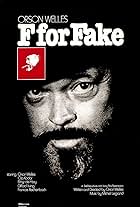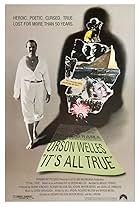After a screening of 'The Trial' at the University of Southern California, Welles discussed with the public and tried to answer their questions.After a screening of 'The Trial' at the University of Southern California, Welles discussed with the public and tried to answer their questions.After a screening of 'The Trial' at the University of Southern California, Welles discussed with the public and tried to answer their questions.
Photos
Storyline
Did you know
- TriviaWelles claims that Michael Salkind produced the G.W. Pabst version of 'Don Quixote' (1933), which he calls 'Don Quixote of Chaliapin' (because Feodor Chaliapin was the star). In fact, Michael and his son Alexander worked for many years to produce a film of the Bruno Franks novel "A Man Called Cervantes" with King Vidor as director. That partnership dissolved and Vincent Sherman eventually directed the project in 1967 under the title, 'Cervantes' (aka; 'Young Rebel'); five years *after* Welles story of meeting the Salkinds took place. It is entirely probable that the Salkinds discussed their ongoing Cervantes project with Welles in the early 60s, but by 1981 Orson has conflated that story with the Pabst 'Don Quixote' film, as the Salkinds actually had nothing to do with the production of the 1933 film.
- Quotes
Orson Welles: Like all people who have lived under occupation for a long time, the Irish for instance and particularly, the Yugoslavs had lived for 400 years under the Turks. We must understand that all people who are occupied for a long time, learn as an act of honor, to steal from strangers. Quite seriously. In other words, they won't steal from each other, but it's a stranger comes with a lot of money from Hollywood or whatever it is - steal if you can.
- ConnectionsFeatured in The Eyes of Orson Welles (2018)
But really, for the substance, this is a must watch for Welles fans and admirers of the Trial should check out. He's witty and serious, deadpan and charming, a raconteur and a straight-shooter. For a man who may be only known to some audiences today, unfortunately, for his outtakes of wine and frozen peas commercials, or for his problems with the studios and in taking quick projects to finance his (not all finished) independent productions, he's rather down to Earth and humble about his work. He is an artist and he lets you know it, but there's never a trace of there being much ego, and can even be self deprecating here and there, though about the Trial it's clear he is happy with the finished product (though, again his humble-ness and as with Othello, he says it's up to the critics to decide whether it's good or not).
There's stories about the casting, Perkins and his 'gay' characterization by critics, how the Salkinds (who later did Superman) got involved, and he can get into discussions about craft with clarity and decidedness. Kafka, of course, comes up quite a bit, as well as his style and what he thinks of 'Escapist' movies (oh if only he could see it today). The range of questions is fair for a Q&A - they range from thoughtful to surprising to a little long-winded and crazy (about him being constantly against corporations, that one gets lost), but Welles always manages to answer best he can, and he's having a good time with a frank and honest and sobering discussion about what it means to make a movie in all its terms. The filming conditions aren't totally ideal - the cuts make a good argument for why video is necessary for such LONG Q&A's, there's no need for artistry in such a setting on Gary Graver's part - but no matter.
Welles holds court, and is about the most interesting watch you can get with a master of the American (and world) cinema.
- Quinoa1984
- Feb 2, 2015
- Permalink
Details
Contribute to this page




















